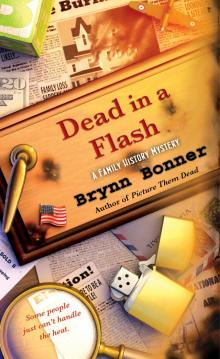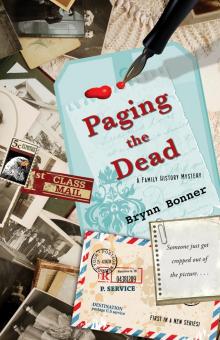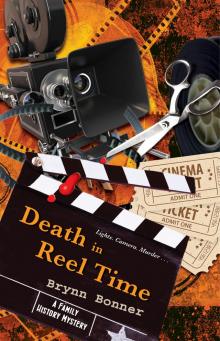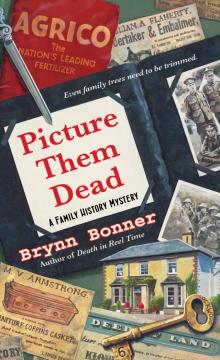- Home
- Brynn Bonner
Paging the Dead Page 18
Paging the Dead Read online
Page 18
“That is quite a story, Winston,” Esme said. “And now that you know, how do you feel about it all?”
“Conflicted,” Winston said. “It makes me sad that it had to be that way. But I feel relieved, too. I was afraid I’d find an ancestor who’d taken unfair advantage, or worse. I had a terrible dread of that. So this has put my mind at ease. Nobody wants to think they owe their existence to a situation like that.”
The doorbell rang and Esme went to answer it.
“Do you know what became of the children who stayed with Delsie?” I asked.
“Yes, I’m happy to say all the children were well provided for. They all went to school and grew to adulthood and had families of their own and lived full lives, save one daughter who died in the 1918 flu epidemic.
“That’s amazing,” Coco said. “So, all along this man was hiding his children in plain sight.”
Just at that moment Vivian came through the door. She was white as a sheet and I wondered if the sight of so much work still undone had scared her.
“What did you say?” she asked, staring at Coco with her mouth half open.
“Nothing,” Coco said, frowning.
“No, you did,” Vivian insisted. “Something about hiding something.”
“This is our regular meeting night, so we’re talking about our own family histories while we work,” I said. “Is there something we can do for you, Vivian?”
“Actually, it was Winston I was looking for,” she said, turning in his direction, a deep frown cutting lines across her forehead. “I thought I might find you here since Esme and Sophreena seem to have drafted everyone for miles around to help with their work. I was wondering if you’d mind delivering the baked goods for Dorothy’s memorial yourself. It was nice of you to agree to make all those pastries, but I’m going to be spread very thin that day and I don’t know when I’d pick them up.”
“Don’t worry, I’ll bring them up, Vivian,” Winston said. “Is there anything else I could help out with?”
“Well, since you asked,” Vivian said, the words coming out fast, “could you come up to High Ground tomorrow to help with some of the outdoor preparations? One of the men I hired has a family emergency and he’s left me in a lurch.”
“I’ll be there,” Winston said.
“Good, then,” Vivian said, glancing nervously up and down the tables.
“Everything will be ready,” I said, pre-empting her question.
“Good, then,” she said again. “I’ll let myself out.” She moved toward the door as if her legs were made of wood.
There was dead silence until we heard the door close.
“I’m worried about her,” Marydale said.
“I think she’s still in the denial stage of grief where everything seems unreal,” Esme said. “Planning this memorial’s the only thing holding her together right now.”
eighteen
I’M ALLERGIC TO MORNING. MY EYES ARE ALWAYS ALL PUFFY and I’m generally opposed to everything the world has to offer for the first fifteen minutes after I’m forced to start the day. Today I was especially tired, and cranky to boot. Jack had finally shown up the night before, but not until after nine when the others were getting ready to leave. He’d been dressed up so he hadn’t been working late. He didn’t volunteer where he’d been and I couldn’t ask since I didn’t want to know the answer. He seemed happy and said he was just dropping by to say hello and that he needed to get home to bed since he had a big project today.
Fine. By. Me.
And now Esme was insisting on our morning power walk, which I would just as soon have skipped. As always I was practically trotting alongside her as we hit the sidewalk. She had a head of steam up about something this morning.
“You wanna talk about it?” I asked, trying to keep from puffing.
“I can’t understand why this has to come this hard,” she said. “I’ve been open. I’ve been willing. Why can’t she just tell me flat out whatever it is she wants me to know like she did with the ring being in the puzzle box?”
“Sarah Malone?”
“Of course, Sarah Malone, who else are we talking about?” Esme said. “I’ve about had it with the woman. At first everything was clear, then it was like you said, bad poetry and now it’s only images. And I don’t have a clue what they mean. We didn’t find any special quilts in the Pritchett family heirlooms, did we?”
“No, no family ones. Which is sort of unusual, especially for a southern family. But no quilts. Not that Dorothy knew of, anyway, and there weren’t any in the attic. Why?”
“I keep getting this image of a quilt,” Esme said. “A really pretty hand-pieced quilt in pastels, like a baby quilt. But as I’m admiring the pattern it gets turned onto the backside, which is plain old hopsacking.”
“Are you sure this is coming from Sarah Malone?”
“Positive.”
I knew better than to ask Esme how she could be so certain. She’s tried a thousand times to explain to me how these things come to her, but I don’t pretend to get it.
“Well,” I said. “All I can tell you is I haven’t run across any quilt that was significant to the family, not to Dorothy anyway.”
When we got to Top o’ the Morning I scanned the parking lot for Jack’s Jeep, but it wasn’t there. I was disappointed, then relieved, then disappointed again.
Esme was still agitated and when she yanked the coffee shop door open Denton Carlson was standing there, coffee cup in one hand, the other extended as if about to push. His partner, Detective Jeffers, was right behind him and when she caught sight of Esme and me she got a sullen look on her face.
“I’ll be in the car, make it quick,” she said to Denton, giving us a curt nod before she hurried across the street to a blue sedan.
“Who peed in her Wheaties?” Esme said, scowling after her.
“Never mind her,” Denny said, motioning for us to follow him a few feet down the sidewalk for privacy. “This case is a career maker, or breaker. It’s that last that’s worrying her. And with that in mind I’m gonna trust you two with something we just learned. But this can’t go any further right now, not even to your friends. The DNA results from those coffee cups came back this morning.”
“What happened to the massive backlog?” I asked.
Denny shrugged. “Prominent family. Money. You know how that goes, things jump to the front of the line.”
“What did it show?” Esme asked.
“Nothing in the system,” Denny said. “But here’s the thing. One sample is Dorothy’s and the other is from a male—a related male.”
“Jeremy?” I breathed.
“As far as I know he’s her only living male relative, right?” Denny said. “You’d know. That’s the reason I’m telling you about this.”
I mentally ran through the family chart. “Yeah, I think so, but let me go back to the house and double-check. Maybe there are distant cousins or something.”
I was almost positive that wasn’t the case, but I desperately wanted there to be another explanation. Now that we’d gotten to know Jeremy Garrison better and had seen the way he was with Cassidy I realized I’d made the same mistake with him as with Dorothy. I’d operated on assumptions. He wasn’t the brooding guy I’d pegged him for at first. He’d had good reasons for resenting the Pritchett family, but enough to kill Dorothy to exact revenge? I didn’t think so.
“The thing is, Jeremy denies he was even in that room that day,” Denny said.
“Why would he lie about that?” I asked. “He was in and out of that house all the time. He had free run of the place. And he was there that day. He picked up Cassidy.”
“So why deny it if he had coffee with Dorothy in that sitting room? That’s what I’d like to know,” Denny said. “In fact we’re about to go ask him that question and see if he’ll give us a DNA sample so we can see if we get an exact match. Let me know if you turn up any long-lost male relatives,” he added, glancing across at the cruiser where an impatient J
effers was waiting behind the wheel. He gave Esme a quick smile that had nothing to do with the case then strode across to the car. He barely had a chance to close his door before Jeffers pulled away from the curb, tires squealing.
• • •
“Give it up, Sophreena,” Esme said an hour later. “You’ve been bent over those charts for long enough. If there was anybody to find you’d have found them by now.”
I slapped the notebook closed. “You’re right. You know, when you look at the charts it’s a miracle the Pritchett name survived as long as it did, or that the family didn’t die out altogether. Before Dorothy and Ingrid there were four generations with only one child.”
“So, that leaves only Jeremy,” Esme said, pursing her lips. “That’s troublesome, very troublesome, but I just can’t accept that this means what it appears to mean. First off, Cassidy truly loved Dorothy and that had to count for something big in his book, right? And he’s not a hothead, in fact, just the opposite—he’s kind of aloof. Even when he’s angry he’s always in control. And from everything we’ve heard this was a violent outburst, not something planned.”
“But what if it wasn’t? What if it was a coldly calculated act? Joe Porter said Jeremy was shocked there weren’t more assets in Dorothy’s estate. And I’m sure Jeremy and Ingrid both figured Ingrid was going to benefit in some way from Dorothy’s will.”
“Hard to think about,” Esme said. “But I know I’m not objective. I don’t want anything bad to happen to Cassidy. Let’s just hope there’s some rational explanation for that coffee cup having Jeremy’s DNA. Right now we’ve got enough to worry about, Sophreena. We only have one more day to get all this finished.”
We worked without interruption for the next three hours. The pages got plainer as we went along, with fewer embellishments and less detail work, but I tend to be a minimalist so that suited me fine. Plus, if Vivian was right and these ended up in some community display, the cleaner pages would be more appropriate—and more honest. These scrapbooks weren’t works of love constructed by a family member; they were produced by our hired hands. To me it was like paying someone to pick out your wedding dress—or maybe your husband. I much preferred Laurena Pritchett’s humble commonplace book. It was messy and had little to offer in the way of design or aesthetics, but it was heartfelt and reflected real lived experiences.
I stretched my arms high and worked my head from side to side. Esme stood and reached for the ceiling, nearly touching it with the tips of her fingers, then twisted and slung her arms around. Our eyes swept the room and then we looked at each other, wide smiles spreading across our faces.
“Mercy, mercy,” Esme said, “I can see the end of this thing. I think we can finish this up tonight.”
But the good cheer didn’t last. A minute later we got a call from Linda Burnette.
“I’m up at High Ground,” she said. “Winston took a spill off the ladder. He’s hurt but he won’t let us call an ambulance. I think he’s broken something. Can you or Esme come and see if you can talk him into going to the hospital?”
Stiff muscles and fatigue were forgotten and Esme broke her own land speed record getting from our house to High Ground.
Linda, Vivian and a couple of other volunteers were gathered around Winston, who was sitting on the decking of the wide porch off the back of the house. He was clearly in pain but when he caught sight of us he started grousing.
“Oh, for pity’s sake, don’t tell me they called you. I’m fine. I just need to walk it off.” He tried to scramble up, but his foot wouldn’t hold and he fell back onto the planking with a thud.
I knelt beside him and folded up his pant leg. His ankle was hugely swollen and turning purple. I untied his shoe and though I tried to slip it off gingerly he winced and made a grunting sound.
Esme sat on the steps and leveled a look on him, her dark eyes flashing. “Winston, you’re going to the ER one way or the other. Now do you want me to call an ambulance, or do you want us to carry you to my car?”
Winston took one look at her and knew not to argue. “Fine, I’ll go with you,” he said.
While Esme pulled her SUV up close I went into the kitchen to round up something to make an icepack. As I was rummaging in the drawers looking for a big dishtowel I heard voices I recognized coming from the hallway.
“Quiet, Cassidy will hear you,” Ingrid said.
“She’s upstairs,” Jeremy answered. “And besides, you don’t think she’s going to hear about this? The police questioning her father? It’ll be all over town.”
“They have no reason to suspect you of anything,” Ingrid said. “None at all.”
“You weren’t there, Mother,” Jeremy said. “I’m telling you, I’m a suspect. They kept me there for two hours; they took my DNA, for God’s sake.”
“They don’t know anything,” Ingrid said. “If they did they’d have made an arrest by now.”
I realized—too late—that their voices were moving closer. Ingrid stopped short as she came into the kitchen and saw me standing there with the dishtowel I’d taken from the drawer flapping in the breeze from the open door.
“Sophreena!” she said. “I didn’t realize anyone was in here. What are you doing?” She frowned as she saw the cluster of people out on the porch, trying to get Winston to his feet. “What’s going on?”
I moved to the refrigerator and made a lot of noise getting the ice, hoping she wouldn’t realize I’d overheard their exchange. I told her about Winston’s injury and she asked if there was anything they could do.
“We’ve got it,” I said. “I know you must have a lot to do to get ready for tomorrow.”
“Vivian can handle things here,” Jeremy said. “If you need help just let me know.”
He seemed sincerely concerned and I wanted to believe that’s the kind of person he was. But could I? There was something unsettling about what I’d just overheard.
When I got back outside Winston was getting situated, his leg stretched across the two seats in the back of the SUV. I put the makeshift ice bag over his ankle, causing him to flinch again. Within seconds Esme was behind the wheel and we were off to the ER.
We’d have left an ambulance in the dust.
• • •
“I do not understand that woman,” Winston’s daughter-in-law, Nancy, said as we sat in the ER waiting room while Winston’s broken ankle was being put in a cast. “Patsy’s still at her sister’s. I called her and told her what happened, but she doesn’t want to come home. She says he can manage fine and it would be too expensive to change her ticket. I mean, I hate to be a walking cliché and complain about my mother-in-law, but she is such a cold fish!”
Nancy, a petite, vivacious brunette, was a kindergarten teacher. She was married to Winston’s oldest son, Foster, and they had two rambunctious pre-teen boys. Winston loved Nancy like a daughter. He’d been reluctant to let me call her, but once it became clear the injury couldn’t be brushed off he’d had no choice.
“He could come to our house,” I said. “We have a guest room on the ground floor.”
“No, he’ll want to go home; he’ll insist,” Nancy said. “Foster’s out of town on business, but he’ll get the first flight home and the boys and I will stay at the house with Daddy Win tonight. He’ll hate being fussed over, but he’ll just have to get over it.”
“That’s really sweet of you,” Esme said.
“He’s a sweet man,” Nancy said. “He brings out the good in everybody.” She curled her lip. “Well, almost everybody.”
Winston came out a few minutes later, struggling to work the crutches.
“Daddy Win,” Nancy said, rushing to give him a hug. “How in the world did this happen?”
“I’d like to know that myself,” he said. “I was helping hang baskets of ferns around the porch up at High Ground. I checked the ladder, I know I did. Vivian even came over and held it for me. Linda was handing the ferns up and we were talkin’, sort of remembering this and that about Do
rothy, and everything was going along smooth. Then somehow the ladder slipped and I went keister-over-teakettle.”
“Thank goodness it’s just an ankle and not a knock on the head,” Nancy said, tiptoeing to kiss him on the cheek. “Now come on, let’s get you home. The boys want to set up a crutch racing course in your backyard.”
“God help us,” Winston said, but he was grinning.
As I watched them make their way to Nancy’s car I felt sad. When I’d first met Winston I’d assumed what I heard about Patsy Lovett was exaggerated. But then I got to know her and she really was a God-awful harpy. How did a lovely man like him get hitched up with someone like that? I thought of how Joe Porter had described a vibrant and fun Dorothy, a woman neither Esme nor I could imagine based on our experience with the imperious matron Dorothy had become. People change. Or more troubling still, people aren’t always what they seem.
• • •
After another two hours of steady work Esme and I had finished all the scrapbooks and packed up everything to cart it up to High Ground the next day. Complete. Fini. Done.
I should have been elated. So why did everything feel so undone?
I called Jack to tell him about Winston and heard dishes clanging and restaurant noises in the background. “Does he need anything?” Jack asked. “Is there anything I can do?”
I told him I thought Nancy had everything covered and began telling him how the accident had happened but he cut me off.
“Hey, Soph, this isn’t the best time to talk. Can I call you back?”
Sure, he could.
But he hadn’t.
Esme accepted a supper invitation from Denny and I didn’t even have the energy to tease her about it. She continued to claim she was only doing it to stay close to the investigation, but I don’t think she expected me to believe her, especially since she came down the stairs looking gorgeous and she allowed Denny to pick her up at our house and drive her to the restaurant instead of meeting him there. This was definitely a date. She tried to get me to come along with them, but I had no interest in being a third wheel. I told her I was looking forward to vegging out and watching a movie.

 Dead in a Flash
Dead in a Flash Paging the Dead
Paging the Dead Death in Reel Time
Death in Reel Time Picture Them Dead
Picture Them Dead